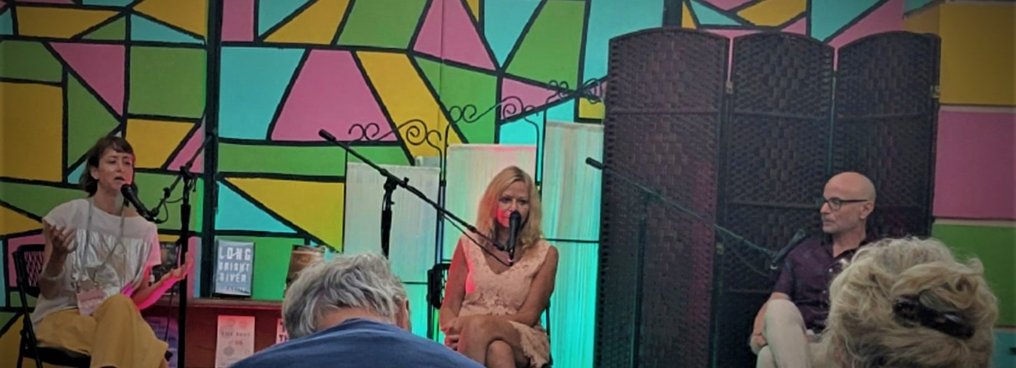
On a breezy January evening, I attended a writers’ workshop in palm garden of the Key West library. I listened to a panel of published writers Laura van den Berg, Joyce Maynard and David Treuer discussing privacy and genre when the author is a protagonist. Followed by Liz Moore speaking about the process of writing her book Long Bright River. Researching these names on Amazon produced a wealthy body of their work supplemented by short biographies, all meaningfully published authors, two of them academia teachers in the field of creative writing. For me, time well invested listening to these accomplished people speak about their craft.
I sat in the court yard of the library occasionally poked by areca leaves as the wind whooshed through the area ruffling the palms. I looked around the audience, most of whom appeared to be paid participants of the 39th Annual Key West Writers Seminar, this year titled “A Seminar Named Desire.” The cost to attend this seminar was $675 but there were three free events open to the public. I joined one of them. At the end of the session, audience had an opportunity to ask questions. “Could there be legal repercussions from family members when writing about dead people?” The response was be truthful in your writing, one cannot be liable for telling the truth and of course dead people can’t sue. Another question was related to the process of writing the Long Bright River, how many revisions did the book go through? Response: writers take many different approaches to writing, some write the first draft very fast, just to get words out on paper and then go through numerous revisions. In this case, Liz Moore said, as opposed to having many revisions of her work, she has many starts. At the beginning of a project, Liz writes and re-writes the first part of the book, but after she gets that right the rest comes out and no major re-writes are necessary. There were other questions but I don’t remember and don’t care to bore you – what I do wish to share are my thoughts as I looked around and listened.
In my former career when I reached the pinnacle aligned with my desire and expectation for professional achievement, I mingled and interfaced with very accomplished and successful people in my field. People who ran high tech companies, directed employees, strategized over product innovations, analyzed markets where the products could be sold for significant revenue, worked on cost cutting initiatives, incentives, profit margins, annual reports, valuations, so on and so forth. We attended our sort of events called trade shows, where we listened to seminars and presentations by accomplished people in our field. It was all very comfortable, I knew the people, understood technology, spoke the same cryptic, acronym littered language and laughed at the same jokes. In the Palm Garden of the Key West Library, I entered a different sphere. Here were people very comfortable in their trade and with their skills, very accomplished, published, sharing knowledge of their art. Am I a guest or an intruder? How amazing it is to have an opportunity to enter a completely different scene and to enter it at a meaningful level. I have said in the past that a meaningful life is one that has many significantly different chapters. I want to live many lives and I want to repeat a level of desired success judged by my own measure and gain experience in drastically different fields. I believe it would be a small challenge to go from one high tech company to another and to repeat a level of success but what a delicious challenge to step from a left-brained industry into a right-brained one. What could be the measure of my success? I want to be published!
In the seminar Liz Moore said that on average it takes her 4 years to research, write and publish a book. WoW! That is a long time! I cannot imagine that publishing one book can pay for 4 years of effort, hence a job as an instructor at Temple University. It must be hard to make a living from creative writing.
The most important take away from the seminar: if you write a book and you draw stories or descriptions from real-live men around you, and maybe some of the written characters might be insulting to people who can see themselves in your work. Preemptively state that the male characters in your writings have small penises and that will save you much grief because no living man will ever admit a relevance to such a character.


I think you received some truly sage advice…
I agree with that and I would have never thought of taking such an approach if not for the seminar.
Hahahaha!!! I see that you learned the most important tip! Now what to say about the women characters? 🙂 love your posts.